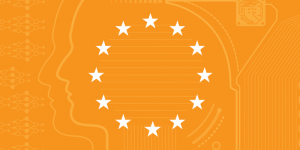Home
Use our global calendar of privacy events to locate an event near you.
FILTER BY

Although the EU is investing heavily in research in artificial intelligence (AI), the EU’s General Data Protection Regulation (GDPR), which will go into effect in May, includes numerous provisions that will impede the development and use of AI in Europe. For example, the GDPR establishes a right to have a human review and explain algorithmic decisions, a requirement that will make it more difficult for companies to automate certain processes using AI. Similarly, the GDPR creates a right for consumers to demand that companies erase all copies of their personal data, a requirement that may undermine the integrity of algorithmic models. Furthermore, the huge fines associated with failing to comply with the GDPR, along with uncertainty about how to comply, poses risks even for companies doing their best to comply.
Join the Center for Data Innovation for an overview of a new report outlining how the GDPR will impact the development and use of AI, and a panel discussion about what Europe should do to support increased AI development and adoption.
Follow the conversation on Twitter using #datainnovation.

| This series of 3 one day roundtables for peer group exchange will focus on managing the EU General Data Protection Regulation (GDPR) compliance process. Regulators and policy makers will not be invited to these roundtables.
Whatever happens with Brexit, your organisation will continue to trade with some of the 30 countries in the European Economic Area and you need to ensure that your organisation is complying with the GDPR. The emphasis will be on sharing experience to help you organise and manage the process rather than giving legal advice on the impact of the GDPR. Hosts will report on progress in their organisations. In addition, you should expect to discuss your plans with the group. Everyone learns and benefits from this participatory process. Each Roundtable will be limited to 25 people to facilitate discussion in a relaxed atmosphere. Lunch is included at each Roundtable, ideal for networking. GDPR HELP! ROUNDTABLES – Session 3: On The Starting Blocks Date: 28 March 2018, 09.00h.-17.30h. Programme: Registration: Each session qualifies for 6 CPD hours. Every Privacy Laws & Business event qualifies for accredited CPD hours for the purposes of the England and Wales Solicitors Regulation Authority’s requirements. Please quote AQJ/PLBU when applying for the points with the SRA. |
featuring author, Jennifer E. Rothman, Professor of Law and Joseph Scott Fellow, Loyola Law School
Tuesday, April 3, 2018 at 12:00 pm
Berkman Center for Internet & Society at Harvard University
Harvard Law School campus
Wasserstein Hall, Milstein East A (Room 2036, second floor)
RSVP required to attend in person
Watch Live Starting at 12pm
(video and audio will be archived on this page following the event)

There are many benefits to making health data
available for secondary purposes, such as academic
research and drug development. One legal basis for
doing so is to obtain patient consent, however, this
has a number of practical challenges. The main
alternative legal basis is to de-identify the data. This
presentation will describe risk-based de-identification
techniques that have been in use for more than a
decade globally to de-identify health data. The basic
principle is to balance the risk of identity disclosure
with data utility that would facilitate beneficial uses of
the data. Methodological as well as practical
considerations will be discussed.

==============CALL FOR PAPERS==============************************************** Privacy by Design in PracticeTrack at the 33rd ACM Symposium on Applied Computing************************************** The Symposium
———————
For over thirty years has the ACM Symposium on Applied Computing been a primary gathering forum for applied computer scientists, computer engineers, software engineers, and application developers from around the world. SAC 2018 is sponsored by the ACM Special Interest Group on Applied Computing (SIGAPP www.acm.org/sigapp). Its proceedings are published by ACM; they are also available on the web through the ACM Digital Library www.acm.org/dl. More information about SAC 2018 can be found at www.sigapp.org/sac/sac2018/. The Privacy by Design in Pract
ice track
—————————————————
The aim of this track is to promote research on privacy-preserving technologies to be used in practice. “Privacy by Design” is a requirement in the new EU data protection regulation, which will be applied in the EU countries from May 2018. Thus, privacy needs to be considered by engineers from the beginning and built in to newly developed systems properly.
The track seeks submissions from academia, industry and public authorities (e.g. data protection agencies) presenting novel research on how to implement Privacy by Design in practice. Examples of successful projects where Privacy by Design has been implemented in practice are especially welcome. Legal researchers bringing in their view on Privacy by Design are also very welcome to submit papers to this track to foster multi-disciplinary research. Topics of the track include, but are not limited to:
– Privacy Engineering
– Privacy-enhancing Technologies
– Anonymization and Pseudonymization
– Privacy in the Internet of Things (e.g. Smart Home, Smart City, Connected Cars, Smart TV, Smart Grid, etc.)
– Privacy and Quantified Self
– Privacy Laws and their impacts on technology
– Conflict between Privacy and SecurityImportant Dates
———————-
September 15, 2017: Submission of regular papers and SRC research abstracts
November 10, 2017: Notification of paper and SRC acceptance/rejection
November 25, 2017: Camera-ready copies of accepted papers/SRC
December 10, 2017: Author registration due date
April 9 – 13, 2018: SAC 2018 in Pau, FranceTrack Program Chairs
—————————–
– Ronald Petrlic, Commissioner for Data Protection Baden-Württemberg
– Christoph Sorge, CISPA, Saarland UniversityProgram Committee
—————————-
Christoph Bösch, Ulm University, Germany
Claude Castelluccia, INRIA France
Tooska Dargahi, University of Rome Tor Vergata, Italy
Martin Degeling, CMU USA
Isao Echizen, National Institute of Informatics, Japan
Felix Gomez Marmol, Universidad de Murcia, Spain
Bart Knijnenburg, Clemson University, USA
Sebastian Pape, Goethe University Frankfurt, Germany
Andreas Reiter, TU Graz, Austria
Burkhard Schafer, University of Edinburgh, GB
Francesc Sebe Feixas, University of Lleida, Spain
Dirk Westhoff, University of Applied Sciences Offenburg, Germany
Submission Guidelines
——————————
The submission guidelines must be strictly followed for a paper to be considered.
Original papers from the above mentioned or other related areas will be considered. Only full papers about original and unpublished research are sought. Parallel submission to other conferences or other tracks of SAC 2018 is forbidden. Each paper must be BLIND in the sense that it must only include its title but not mention anything about its authors. Self-citation must be in third person, such as “Smith et al. [citation] showed…”. All submissions must be formatted using the ACM conference-specific LaTeX style, which can be obtained from the symposium web page. All papers must be submitted by the deadline stated above.
Papers must be submitted through the symposium-wide paper management system for SAC 2018 athttps://www.softconf.com/h/sac2018. Review and publication of accepted papers
———————————————————
Each paper will be fully refereed and undergo a blind review process by at least three referees. Accepted papers will be published in the ACM SAC 2018 proceedings. Some papers may only be accepted as poster papers, and will be published as extended abstracts in the proceedings.
Student research abstract competition
—————————————————
Graduate students are invited to submit research abstracts at www.softconf.com/h/sac-src2018 following the instructions published at SAC 2018 website. Submission of the same abstract to multiple tracks is not allowed.
More information can be found at: www.legalinf.de/pbd2018

Event:
Please join us at a poster session celebrating the final projects of the IPSI course “Seminar in Identity, Privacy and Security”. This year’s final projects cover a wide range of topics on current practices and emerging applications, which include privacy and security issues related to the smart home, unmanned aerial vehicles, blockchain technology, and multimedia forensics. Students will provide an in-depth discussion on potential solutions for the issues, such as policy changes and technical implementations. All are welcome and we hope to see you there!


About the Event
As facial recognition technology becomes increasingly sophisticated, and the presence of such devices proves ubiquitous in both public and private spheres, it is critical for researchers to examine the potential effects on both individuals and society as a whole. To this end, the Division of Emerging Media Studies of Boston University’s College of Communication is holding an international symposium to bring together diverse perspectives from social scientists, philosophers, policy-makers, and computer scientists to explore the social, behavioral, and psychological dimensions of this new technological terrain. This unique collection of voices intends to illuminate the various and often competing dimensions of a challenging, complex area of research. Ultimately, it hopes to trace out the implications for society, and the choices that we must collectively and individually make.
Call for Papers
The Division of Emerging Media Studies at Boston University invites research-based perspectives on facial recognition technology. Limited travel support for presenters is available on an as-needed basis. Send abstracts to [email protected].
Symposium Format
The symposium will be composed of brief research-based papers, in-depth scholarly panel discussions, and lively audience participation. Ongoing discourse via Twitter is anticipated. As a clear understanding from an informed viewpoint is our goal, advocacy for particular partisan perspectives is discouraged.
Key Dates
- February 16: Extended abstracts (~250 words) due to organizers. Send abstracts to [email protected].
- March 2: Notification of acceptance decision.
- March 30: Completed papers (~2,500 words) due to organizers.
- April 17: Welcoming reception
- April 18: Symposium held at Boston University.
Overview
Efforts to understand facial expressions and determine identity through technological means has existed since at least the 1960s (Gates, 2011). Decades of technological advancement have amplified the capacity for machines to discern individual identities, and today, facial recognition technology offers promising opportunities in sundry domains; algorithmically- informed predictability can offer substantial benefits in policing and security (Ricanek & Boehnen, 2012), medicine (Tan, Gilani, Mayberry, Mian, Hunt, Walters, & Whitehouse, 2017), and commercial endeavors (Deng, Navarathna, Carr, Mandt, Yue, Matthews, & Mori, 2017). However, these opportunities are simultaneously met with several challenges, such as the lack of regulation (Garvie, Bedoya, & Frankle, 2016), potential for flawed data through algorithmic bias (Introna, 2005; Introna & Wood, 2004), and infringements on personal privacy, particularly with the influx of photo sharing via social media platforms and resultant access to big data (Gasser, 2016; Mohapatra, 2016; Nakar & Greenbaum, 2017; Shaw, 2012).
To more fully understand the complexities of facial recognition technology and its consequences, the Division of Emerging Media Studies at Boston University presents an international symposium, where scholars from a variety of fields will discuss the promises and perils. An interdisciplinary, cross-cutting approach will help to facilitate an in-depth examination of the topic through paper presentations, panel discussions, and a poster session. The symposium will encourage the audience, both in-person and via virtual livestream, to participate actively with questions and debate. The goal of the event is for participants to not only develop a deep understanding of the competing issues at play but also identify actionable next steps within their fields of study.
Practitioners, researchers, and noted scholars of facial recognition technology will be invited to present their work. The Division of Emerging Media Studies invites additional perspectives through the peer-reviewed call for papers. Talks will be organized into panels, where each presenter will each briefly share their work, followed by an extended discussion among panelists.
Agenda (Subject to Change)
- April 17th: Welcome Reception for Speakers and Panelists, location TBD
- April 18th: Hillel Center, 213 Bay State Rd., Boston, MA, USA
| Time | Session |
|---|---|
| 9:30AM – 10AM | Coffee, Light Refreshments, and Registration |
| 10AM | Welcoming Remarks |
| 10:15AM – 11:15AM | Panel 1: A Clear Guide to How the Technology Works; What Is It Doing Currently |
| 11:30AM – 12:30PM | Panel 2: What Is the Technology’s Potential? |
| 12:30PM – 1:15PM | Lunch and Poster Session |
| 1:15PM – 2:30PM | Panel 3: Benefits and Risks of Pushing Facial Recognition Technology Forward |
| 2:30 – 3:15PM | Panel 4: Options and Considerations for the Future of Facial Recognition Technology |
| 3:15PM | Summary Remarks |
| 3:20PM | Adjournment |
| 3:30PM – 4PM | Attendees invited to DeFleur Distinguished Lectureship or the Computer Science Distinguished Lectureship |
International Scientific Advisory Board
- Appel, Lora – OpenLab, University Health Network, Toronto
- Betke, Margrit – Boston University
- Brito, Eliane P. Z. – Fundação Getulio Vargas, São Paulo
- Caronia, Letizia – Università degli Studi di Bologna
- Chen, Yi-Fan – Miami University
- Cushman, Ellen – Northeastern University
- Floyd, Juliet – Boston University
- Laugier, Sandra – Sorbonne University
- Lim, Sun Sun – Singapore University of Technology & Design
- Neff, Gina – Oxford University
- Poiger, Uta – Northeastern University
- Soysal, Zeynep – Boston University
- Takahashi, Toshie – Waseda University

18 April 2018
Law Enforcement Data Access Series: “US CLOUD-Act: Signalling change in global data flows?”
On 18 April 2018, the Brussels Privacy Hub will host its first event in its new Law Enforcement Data Access Series titled “US CLOUD-Act: Signalling change in global data flows?”.
The passing of the Clarifying Lawful Overseas Use of Data Act (CLOUD) Act in the United States (US) is one of the many on recent and going developments that can potentially redefine global contemporary practices of cross-border access to electronic data.
This event will open up the discussion on its significance, bringing together a number of key experts for an open debate on the consequences of the new situation.
Time: 12:00 – 14:30 (lunch included)
Venue: Lisbon Conference Room, Lower Ground Floor, Institue for European Studies, VUB, Pleinlaan 5, 1050 Brussels
Registration: The event is free to attend but capacity is limited, so registration is required.

